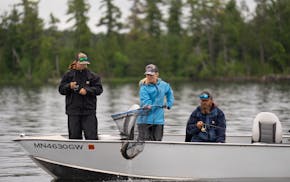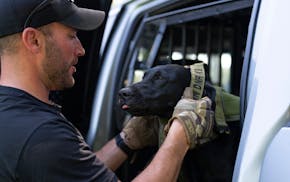This would be Bob James' final paddling trip, the last among many, though he had no way of knowing that when he picked up a solo canoe from an Ely outfitter on May 8.
James first paddled in the Boundary Waters Canoe Area Wilderness as a kid, along with his dad, his brother and two sisters.
He owned a paddle board and a kayak, but no canoe. So the 16½-foot scimitar-like Wenonah Prism he slid into the pristine waters of the BWCA two days before the fishing opener was a rental.
About 48 hours later, James' body was found floating in Iron Lake by a U.S. Forest Service crew on a routine patrol.
Iron Lake is about 15 miles from where James started his trip.
James was wearing a life jacket. His canoe was capsized nearby. He was 62.
Easier ways exist to get to Iron Lake than from the Stuart River, off the Echo Trail and about 22 miles from Ely. But Stuart River was the wilderness access permit James held, and to him the portages that separate it from Iron Lake likely weren't so much obstacles as inconveniences.
"Bob was always in great shape," said his sister, Nancy Oliver of Dallas. "I remember on our BWCA trips he would carry a full load of gear across a portage. Then he'd come running back past us, going for another load."
James preferred to paddle in the Boundary Waters in early May, before people — and bugs — show up in droves as they typically do later in the month.
James also knew early May provides some of the border region's best fishing. He knew, too, that on the first day of the state's fishing season, hungry walleyes would tumble and churn in the foamy waters below Curtain Falls, which spill into Iron Lake from adjacent Crooked Lake.
"Curtain Falls was one of his favorite places in the Boundary Waters," Oliver said.
A software engineer who worked for Optum in the Twin Cities, James was a sociable guy who will be remembered by his friends, according to his obituary, "for his unmatched goofiness and his unapologetic lack of filter." Comfortable in any group, he also had no problem being alone.
"I canoed many times with Bob in the Boundary Waters," said friend Bruce Asmus. As high schoolers, the two ran cross-country together in Hopkins, and then continued to meet weekly at Theodore Wirth Regional Park as members of the Thirsty Thursday Theo Trail Runners club.
"At times during our canoe trips," Asmus said, "we'd be in huge storms. But Bob was always prepared. He knew what to do. For him, traveling alone in the Boundary Waters was no big deal. He did it many times."
High temperatures in the BWCA on May 8 were forecast to touch 70, with bluish skies. Similar weather was expected on the fishing opener and beyond.
Far less pleasant conditions occasionally prevailed when James' dad, Bob Sr. of Coppell, Texas, hauled Bob and his three younger siblings to the BWCA when they were kids.
"We lived in Minnesota 25 years," the elder James said. "Every summer when the kids were teenagers, and even before that, I'd take them to the BWCA. It was a magic time. But sometimes I look back at it and say, 'Why did I do that?' The mosquitoes could be terrible. And especially at the beginning, we'd take too much stuff. The kids would call it their march from hell. But we went back seven or eight years straight."
Among his siblings — Max, Nancy and Betsy — James retained the most active outdoor lifestyle. Whether at home in the Twin Cities or Up North, he'd rise at 5 in the morning to fish. He loved to hike. And in winter, he snowboarded.
Counterintuitively, perhaps, he pursued these activities even though he had a heart arrhythmia for which he was being treated at the Mayo Clinic.
As a precaution, doctors implanted a defibrillator in his chest about a dozen years ago.
"When we ran together, I'd pay close attention to how he was doing — probably a little closer than he wanted," Asmus said. "If he'd slow down or stop, I'd say, 'Is something going on? How do you feel?' But usually it wasn't a problem, and we'd start running again."
En route to Iron Lake, James might have carried all his gear in two Duluth packs, slinging one over his back and toting the other on his chest, strapped on like an accordion.
That way, with the ultralight canoe on his shoulders, he could cross portages in one trip.
"When we traveled in the BWCA, Bob was always the leader, and when he took friends or relatives on paddling trips, he planned everything, including meals," Oliver said. "He always built fresh fish into our meal plans. If it were me alone, I would never plan on catching fish to eat on a canoe trip. I'd bring plenty of other food. But Bob was a great fisherman. He planned on catching fish to eat, and he did."
Iron Lake's 2,000 pine-shrouded acres are as picturesque as any in Minnesota's border country, and its waters as pure. But for many paddlers, after the fishing opener, Iron is more of a pass-through lake than a destination.
Yet whether James planned to stay on Iron Lake until his scheduled exit from the wilderness May 15, or instead travel to another BWCA lake, will never be known.
An autopsy revealed no indication of health issues or, for that matter, trauma, and James' death was ruled an accident. His sister said he died of exposure.
The late author and wilderness guru Sigurd Olson once wrote that, "When a man is part of his canoe, he is part of all that canoes have ever known."
By that measure, Bob James traveled widely and knew a lot, including the satisfaction of physical exertion in a watery wilderness, the thrill of a fish on his line, the seduction of a loon's call and the promise of a morning campfire, with coffee brewing.
"I don't want anyone to think Bob made a mistake going to the Boundary Waters alone. His death is not a cautionary tale, and it shouldn't be viewed that way. He knew what he was doing," his sister said.
"It's just that something happened, and we'll never know what it was."
In addition to his parents and siblings, Robert James is survived by his children, Marcie James of Chicago and Bobby James III of Minneapolis, and his beloved 14-year-old springer spaniel, Snooki, who now lives with James' niece. Services were held May 23.

Anderson: In early June, Minnesota fish are begging to be caught. Won't you help?


